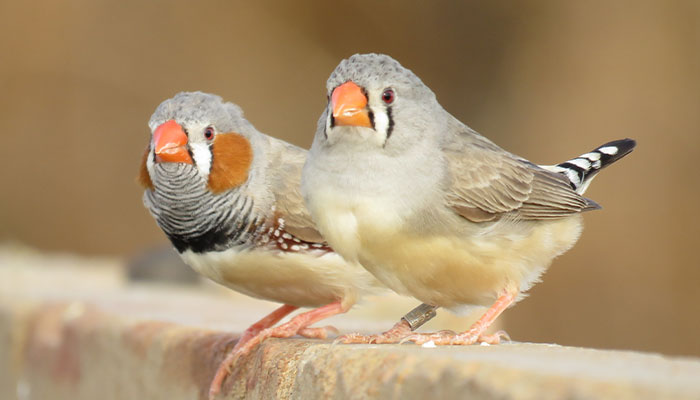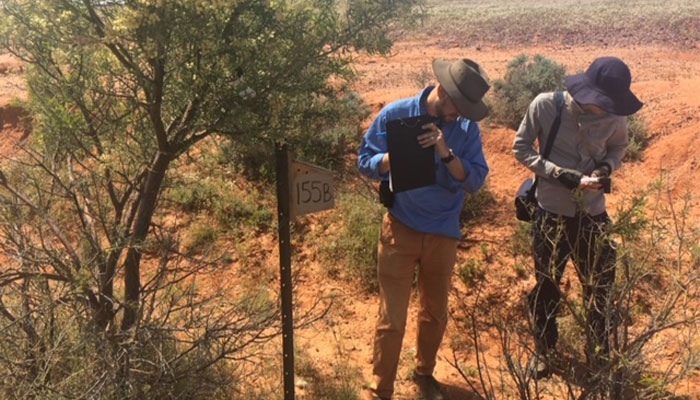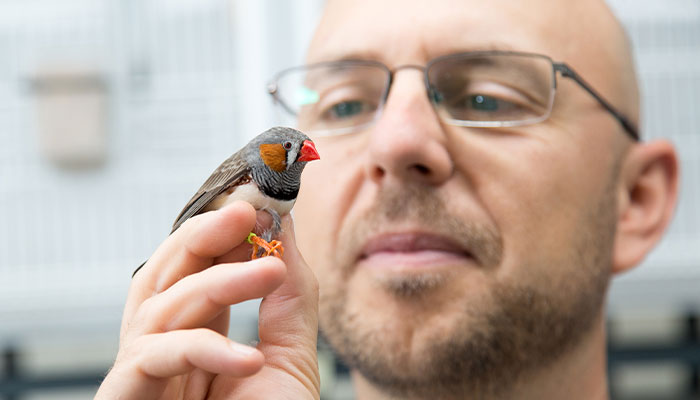In a remote area of north-western NSW, scientists have been studying the local population of zebra finches – one of the most widespread and abundant birds in Australia – for more than 16 years.

Danger zone: Zebra finches are abundant, and in an average year 80 per cent of chicks survive ... but not during heatwave, the researchers found.
In the summer of 2017, they recorded a catastrophic event. A heatwave with temperatures over 40 degrees for several days baked all the embryos in their eggs causing complete reproductive failure for this remarkably resilient bird.
The results are analysed in a paper published in April in IBIS, the International Journal of Avian Science by Professor Simon Griffith, an evolutionary ecologist at Macquarie University.
The parents never abandoned the eggs and in some cases, were still sitting on eggs with dead embryos.
"This is likely to happen more regularly and intensively because of climate change and may affect all bird populations," says Griffith, adding that species more vulnerable and less studied than the zebra finch would also likely have suffered a similar fate.
"This is the first time that this catastrophic level of embryonic mortality has been recorded."
Rain, then devastating heatwaves
During the 2017 event, Griffith and his colleague Dr Luke McCowan, who now works at the Department of Conservation, monitored wild zebra finches that had laid clutches of two to seven eggs in 32 nesting boxes at the Fowlers Gap Arid Zone Research Station.

Action station: Researchers on site at the remote Fowlers Gap Arid Zone Research Station, in north-western NSW.
Every three days during the incubation period, McCowan and Griffith used a digital egg monitor to find the embryos' heartbeat to determine if the eggs were alive and developing. They also measured the eggs' surface temperature with a non-contact infrared thermometer.
Simultaneously, smart heat monitors called iButtons, about the size of a watch battery, recorded the nests' temperature for the researchers every half-hour, combined with hourly air temperature data from the Bureau of Meteorology.
The Fowlers Gap study is the only one where birds live in these extreme temperatures and are monitored to this extent.
The researchers collected all this data over each clutch's 12-day incubation period and did not disturb the parents.
During this time, two heatwaves hit the area when the mercury reached 44 degrees four days in a row.
"The clutches had 100 per cent mortality – two eggs actually hatched but the chicks died soon after," Griffith says. "The parents never abandoned the eggs and in some cases, were still sitting on eggs with dead embryos."
In an average year, 80 per cent of chicks survive and mothers lay up to four times with a possible total of 20 eggs. "Every year is different, depending on the availability of food and the abundance of predators," he says.
In the months prior to the period of reproduction studied, it rained so there was abundant food for the birds and they were strong and ready to breed, Griffith said. Then the heatwaves hit.
No time for birds to adapt
Although there are many long-term bird studies in North America and Europe of different species, there are relatively few in Australia. The Fowlers Gap study is the only one where birds live in these extreme temperatures and are monitored to this extent.

Up close: Evolutionary ecologist Professor Simon Griffith (pictured) says scientists need to study birds over decades to gauge the effects of climate.
Although animals can develop adaptive evolutionary responses to their environment, Griffith says that because these extreme events are happening so frequently, birds and other animals are unlikely to be able to change their breeding habits fast enough.
"Climate change is happening far quicker than the birds can keep up and adapt," he says. "For us to study the effects of climate on birds, we need to study them over decades."
Repeated heatwaves and increasingly high temperatures from climate change are likely to have a detrimental effect on bird reproduction that could seriously challenge some species of the world's bird populations in the long run, Griffith says.
Dr Simon Griffith is a Professor in the Department of Biological Sciences.






